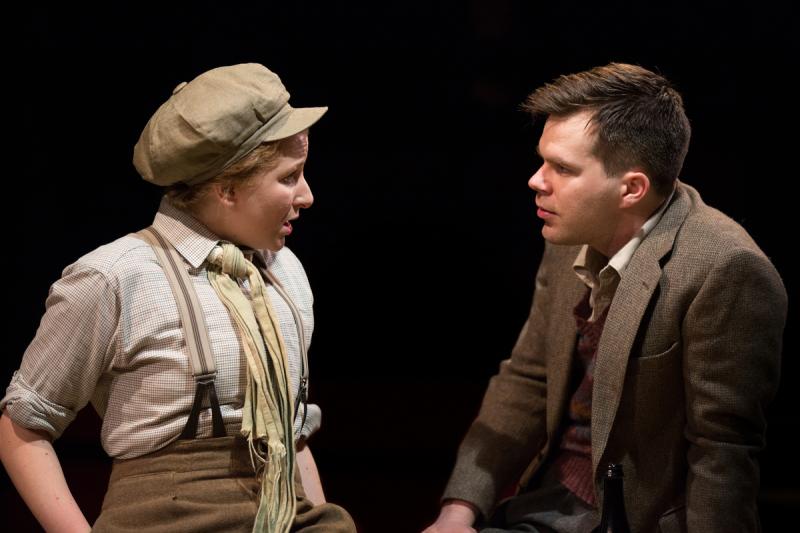As You Like It, Tobacco Factory, Bristol | reviews, news & interviews
As You Like It, Tobacco Factory, Bristol
As You Like It, Tobacco Factory, Bristol
Dark and unsettling version of Shakespeare comedy

Andrew Hilton, the creative force that drives the consistently excellent Shakespeare at the Tobacco Factory, might be playing safe by returning to a play he put originally put on in 2003. But “As You Like It”, for all its light touches, is a challenging proposition: both in terms of the way the author treats complex relationships between play-acting and authenticity, true and projected love, goodness and evil, but also because the many-threaded story doesn’t unfold with quite the same e
This is a play in which structure is a little too apparent and the development of the interconnected stories feels forced rather than natural. The great undoing of illusions and paranoias which takes place in the second half, shot through with meditations on the nature of time and our assumed personae on the stage that is the world, lacks drama, in spite of some great set-pieces. This is a weakness in the text, which any amount of directorial invention can’t fully eliminate.
As ever with Andrew Hilton’s vigorous and intelligent productions, there is much quality acting, an inventive use of the four–sided auditorium and a devotion to delivering the text with maximum clarity. The contrast between urban civility and treachery on the one hand, and the presumed innocence of forest and pasture on the other, are clearly evoked – not least in Chris Bianchi’s skilled morphing from Machiavellian Duke Frederick to wise and good Duke Senior. The dichotomy is also reflected in the costumes, uptight and self-regarding for the city-dwellers and a kind of Glastonbury boho chic (complete with wellies) for the shepherds and other forest folk.
 This is very much Rosalind’s play: she holds the strings, which she twists, pulls, knots, then finally unties in the play’s inevitably contrived dénouement. Dorothea Myer-Bennett has formidable energy and presence. She inhabits the emotional complexities and ups-and-downs with impressive skill. She is often very funny and makes a delightful double-act with her bosom-friend and foil Celia – very capably handled by Daisy May. If anything, there is a relentlessness and excess about this Rosalind, which not only risks overshadowing the other characters but comes close to being a little too predictable and exhausting as the play moves towards its happy-end conclusion.
This is very much Rosalind’s play: she holds the strings, which she twists, pulls, knots, then finally unties in the play’s inevitably contrived dénouement. Dorothea Myer-Bennett has formidable energy and presence. She inhabits the emotional complexities and ups-and-downs with impressive skill. She is often very funny and makes a delightful double-act with her bosom-friend and foil Celia – very capably handled by Daisy May. If anything, there is a relentlessness and excess about this Rosalind, which not only risks overshadowing the other characters but comes close to being a little too predictable and exhausting as the play moves towards its happy-end conclusion.
Much of the play’s sparkle comes from the verbal deconstructions of the two paragons of world-play, the fool Touchstone and melancholy Jacques. The former is played with touching vulnerability, remarkable physical grace and bags of humour by Vic Llewellyn (pictured) . Paul Currier is a strong presence as the latter, although his camp mannerisms are a little OTT. These two masters of spin delight in a mixture of the wise and the absurd.
What is perhaps most unsettling about “As You Like It” is the play’s fundamental melancholy: Shakespeare makes us laugh but, in a sublimely sophisticated way, also exposes the emptiness of words, the deception of appearances and the frailty of human existence. This production is a good deal darker than Hilton’s more extrovert and ebullient version of 11 years ago. This is perhaps most tangible at the play’s close, when the celebratory dance just doesn’t deliver the unequivocal buzz that his shows usually achieve with such verve.
The high point of emotion in this production comes early on, as Rosalind and Orlando fall in love at first sight, following the dramatic violence of the young hero’s victory over the brawny court wrestler Charles. After that thrilling moment, we gradually plunge ever deeper into the realm of abstraction never again quite touching the feeling depth achived early on. This process creates a distance that all the playing in the world cannot quite overcome.
- As You Like It at the Tobacco Factory until 2 May
rating
Explore topics
Share this article
The future of Arts Journalism
You can stop theartsdesk.com closing!
We urgently need financing to survive. Our fundraising drive has thus far raised £49,000 but we need to reach £100,000 or we will be forced to close. Please contribute here: https://gofund.me/c3f6033d
And if you can forward this information to anyone who might assist, we’d be grateful.

Subscribe to theartsdesk.com
Thank you for continuing to read our work on theartsdesk.com. For unlimited access to every article in its entirety, including our archive of more than 15,000 pieces, we're asking for £5 per month or £40 per year. We feel it's a very good deal, and hope you do too.
To take a subscription now simply click here.
And if you're looking for that extra gift for a friend or family member, why not treat them to a theartsdesk.com gift subscription?
more Theatre
 Troilus and Cressida, Globe Theatre review - a 'problem play' with added problems
Raucous and carnivalesque, but also ugly and incomprehensible
Troilus and Cressida, Globe Theatre review - a 'problem play' with added problems
Raucous and carnivalesque, but also ugly and incomprehensible
 Clarkston, Trafalgar Theatre review - two lads on a road to nowhere
Netflix star, Joe Locke, is the selling point of a production that needs one
Clarkston, Trafalgar Theatre review - two lads on a road to nowhere
Netflix star, Joe Locke, is the selling point of a production that needs one
 Ghost Stories, Peacock Theatre review - spirited staging but short on scares
Impressive spectacle saves an ageing show in an unsuitable venue
Ghost Stories, Peacock Theatre review - spirited staging but short on scares
Impressive spectacle saves an ageing show in an unsuitable venue
 Hamlet, National Theatre review - turning tragedy to comedy is no joke
Hiran Abeyeskera’s childlike prince falls flat in a mixed production
Hamlet, National Theatre review - turning tragedy to comedy is no joke
Hiran Abeyeskera’s childlike prince falls flat in a mixed production
 Rohtko, Barbican review - postmodern meditation on fake and authentic art is less than the sum of its parts
Łukasz Twarkowski's production dazzles without illuminating
Rohtko, Barbican review - postmodern meditation on fake and authentic art is less than the sum of its parts
Łukasz Twarkowski's production dazzles without illuminating
 Lee, Park Theatre review - Lee Krasner looks back on her life as an artist
Informative and interesting, the play's format limits its potential
Lee, Park Theatre review - Lee Krasner looks back on her life as an artist
Informative and interesting, the play's format limits its potential
 Measure for Measure, RSC, Stratford review - 'problem play' has no problem with relevance
Shakespeare, in this adaptation, is at his most perceptive
Measure for Measure, RSC, Stratford review - 'problem play' has no problem with relevance
Shakespeare, in this adaptation, is at his most perceptive
 The Importance of Being Earnest, Noël Coward Theatre review - dazzling and delightful queer fest
West End transfer of National Theatre hit stars Stephen Fry and Olly Alexander
The Importance of Being Earnest, Noël Coward Theatre review - dazzling and delightful queer fest
West End transfer of National Theatre hit stars Stephen Fry and Olly Alexander
 Get Down Tonight, Charing Cross Theatre review - glitz and hits from the 70s
If you love the songs of KC and the Sunshine Band, Please Do Go!
Get Down Tonight, Charing Cross Theatre review - glitz and hits from the 70s
If you love the songs of KC and the Sunshine Band, Please Do Go!
 Punch, Apollo Theatre review - powerful play about the strength of redemption
James Graham's play transfixes the audience at every stage
Punch, Apollo Theatre review - powerful play about the strength of redemption
James Graham's play transfixes the audience at every stage
 The Billionaire Inside Your Head, Hampstead Theatre review - a map of a man with OCD
Will Lord's promising debut burdens a fine cast with too much dialogue
The Billionaire Inside Your Head, Hampstead Theatre review - a map of a man with OCD
Will Lord's promising debut burdens a fine cast with too much dialogue

Add comment